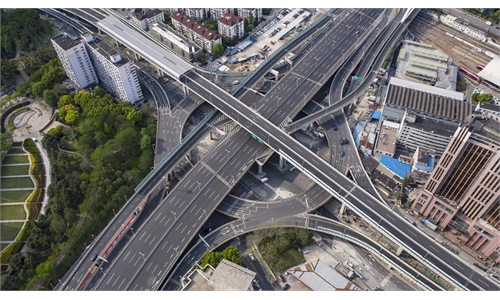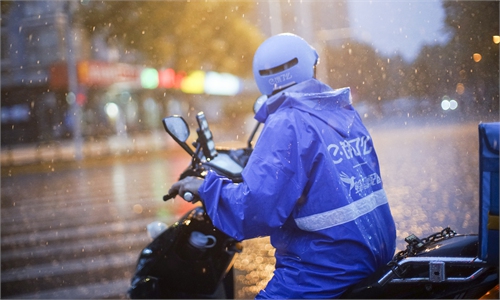Hubei doctors battle Omicron in Shanghai; unified discharging standards established at makeshift hospitals
Medical staff say goodbye to young COVID-19 patients who are being discharged from the makeshift hospital in Shanghai. Photos: Courtesy to Bao Jie of Tongji Hospital
Shanghai has established unified discharging standards for COVID-19 patients and their average hospitalization period has been shortened to about one week at makeshift hospitals, Shanghai local authorities said on Wednesday.
A total of 6,740 COVID-19 patients were discharged from the makeshift hospital at Shanghai New International Expo Centre on Wednesday, which is also the largest number of patients discharged from a single makeshift hospital in a single day, according to media reports.
COVID-19 patients will be discharged or released from medical observation from makeshift hospitals after posting negative nucleic tests twice within a 24-hour interval, according to the authorities. Nucleic acid tests should be conducted daily from the second day after the patients were admitted.
With the rising daily number of new cases, Shanghai has entered a critical stage to combat the virus. A group of doctors from Central China's Hubei Province, who had the experience of fighting COVID-19 two years ago in Wuhan, are working at the makeshift hospitals in Shanghai.
Liu Shunfang, head of the medical team of Tongji Hospital affiliated to Huazhong University of Science and Technology, told the Global Times that the current epidemic situation was different from the situation in Wuhan in 2020.
Thanks to their experience in fighting the epidemic in Wuhan, Liu said that they did not feel nervous or afraid when coming to Shanghai. "At that time, people were afraid of the unknown virus as we had to slowly discover and explore how to fight it," Liu said.
Shanghai's epidemic was caused by Omicron, which is highly infectious and transmits in a hidden way. Most of the patients have mild symptoms or are asymptomatic carriers, so we can detect these people as soon as possible by mass screening, according to Liu.
Wu Qianyu, an official from the Shanghai health authority, said at Wednesday's press briefing that Shanghai's epidemic prevention and control is at the critical stage and continuous screening by nucleic acid and antigen tests are important measures to curb the virus' spread. A total of 9.05 million people were sampled for nucleic acid tests and 10.94 million were screened for antigen testing on Tuesday, Wu said.
Along with traditional Chinese medicine, the makeshift hospitals, which mainly receive mild and asymptomatic cases, have provided health observation and treatment, said the authorities.
There are 1,320 beds in the family-friendly area at the makeshift hospital in Shanghai New International Expo Centre, which admits children with their parents together. Since April 4, the area has been operating at full capacity and 19 medical institutions from Hubei led by Tongji Hospital are now in charge of the area, with over 340 professional working staff including doctors and nurses.
Medical staff say goodbye to young COVID-19 patients who are being discharged from the makeshift hospital in Shanghai. Photos: Courtesy to Bao Jie of Tongji Hospital
In order to reduce the risk of medical staff being infected, Liu said they have arranged seven working shifts to avoid cross-infection. "All the staff keep working every day and it takes four hours for a change in a working shift," Liu noted.
Liu said that it takes about one hour for medical staff to take on and off their medical preventive suits before entering and leaving the makeshift hospitals. "Most of us are exhausted when we take off our preventive suits."
Liu said there are also seven psychological professionals in his team, to guide patients to avoid the occurrence of group depression, anxiety or trauma emergency syndromes.
Liu was relieved to see children being taken care of well and the family-friendly treatment measure helps to reduce parents' concerns, which will be helpful for their recovery. "As a parent, I feel satisfied and relieved if we can do all the work well."
Dong Haoxu, a doctor from the Tongji Medical College of Huazhong University of Science and Technology in Wuhan, told the Global Times that he felt sorry for his wife and daughter because he had to live separately during the fight against COVID-19 in Wuhan in 2020.
However, when he saw the children patients at the makeshift hospital, who are so cute and innocent, he felt that he had to take the responsibility to take care of each child because he knew "each child is a treasure of one family."
Liu and his colleagues are still confident in the fight against the virus. "The advantages of the socialist system are also reflected amid the fight against COVID-19."



